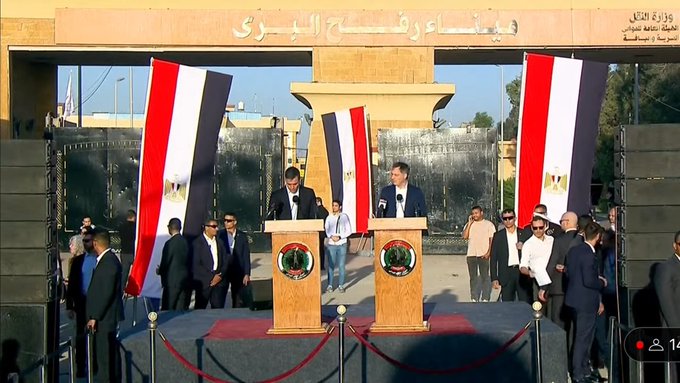Luis Ayllón
Hamas yesterday welcomed the “clear and bold” stance of Spanish Prime Minister Pedro Sánchez and his Belgian counterpart Alexander de Croo on the Gaza war, which they expressed during a tour of Israel, Palestine and Egypt on Thursday and Friday.
In a statement released hours after a diplomatic crisis broke out between Israel and Spain, precisely because of the unease caused in Benjamin Netanyahu’s government by Sánchez’s words, Hamas said: “We appreciate the clear and bold stance of the Belgian Prime Minister, Alexander De Croo, who rejected the destruction of Gaza and the death of civilians, and the Spanish Prime Minister, Pedro Sanchez, who condemned the indiscriminate killing of civilians in the Gaza Strip by the occupying regime and pointed to the possibility of his country taking the unilateral decision to recognise the Palestinian state if the European Union does not take this step.”
That thanks prompted a reaction yesterday from Israeli Foreign Minister Eli Cohen, who on social networking site X called Hamas’s congratulations to Sanchez and De Croo “shameful and unseemly”. He warned: “We will not forget who is with us at this moment and who supports a murderous terrorist organisation that is holding more than 200 hostages”.
Hamas also called on the international community to “stand on the side of justice for the Palestinian cause” and the right to “self-determination” to establish an “independent state”.
In addition, the Palestinian terrorist movement demanded an end to the “genocidal war”, as they describe the action taken by Israel, and called on Israeli leaders to “account for their crimes against defenceless children and civilians.
Sánchez and Croo’s words before Netanyahu and at the Rafah border crossing have caused as much satisfaction in Hamas as anger in the Israeli government, which announced the summoning of the Spanish ambassador in Tel Aviv, Ana Salomon, and her Belgian colleague to send them a “harsh” reprimand. The fact that yesterday was Shabbat meant that the ambassador’s presentation to the Ministry of Foreign Affairs was postponed for at least a day.
Israel’s ambassador to Madrid, Rodica Radian-Gordon, has not been summoned to the Spanish Foreign Ministry this weekend either, although the head of the Department, José Manuel Albares, also announced that she would be summoned to tell her that he considers the accusations made by her Israeli colleague, Eli Cohen, that Pedro Sánchez supports terrorism, to be “unacceptable and false”.
The truth is that Israel and Spain are in the midst of the most serious diplomatic crisis since they established diplomatic relations almost 38 years ago.
From La Rioja, the leader of the PP, Alberto Nuñez Feijóo accused Sánchez of travelling to Israel “to sow discord” and regretted that with his statements he has “seriously resented Spain’s foreign policy”.
According to Feijóo, Sánchez’s actions “have been a mistake in terms of timing, place, form and content”. He added that diplomacy does not mean travelling to a country “in the name and on behalf of the current president of the European Union in order to distance oneself from the majority of the countries of the European Union and NATO”.
The Israeli authorities seem particularly annoyed by Sánchez’s statements calling for a permanent ceasefire in the offensive that Israel has been maintaining in Gaza since the Hamas attack on Israeli territory on 7 October, which left 1,200 dead and more than 240 hostages kidnapped.
Netayahu himself, in his meeting with Sánchez and De Crooo last Thursday, expressed his disagreement with the Spanish Prime Minister’s assertions that Israel “has the right” to defend itself against Hamas attacks, but that it must abide by international humanitarian law.
The Israelis are also unhappy that Sánchez has implied that if he fails to reach an agreement with other European countries he is prepared to take steps to recognise the Palestinian state. And, in any case, the statements by some members of Sánchez’s previous and current governments, belonging to Podemos and Sumar, in favour of the Palestinians and with lukewarm rejections of the Hamas attack, have contributed to the Israeli government’s growing displeasure with the Spanish government.
Another of these manifestations has been the decision not to attend this Monday’s meeting of the Union for the Mediterranean Forum (UfM) being held in Barcelona, due to the change in the agenda of a meeting which, in their opinion, should have been devoted to cooperation, but which will focus on the current war in Gaza.






